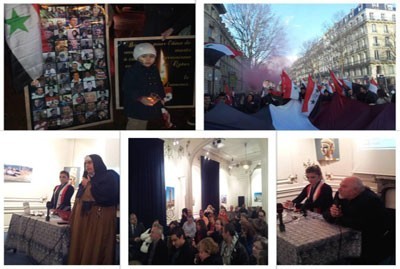Syrian Students Hold Symposium in Paris Illustrating the Reality of Events in Syria


National Union for Syrian Students and the Syrian community in France held a symposium under the title ‘Syria the Resistant between Truth and Foreign Interference’ at the Syrian Cultural Center in Paris to display the facts of what is going on in Syria far from the misleading media campaign.
A film showcasing the crimes of the armed terrorist groups in Syria was screened during the symposium.
Pro. Bassam Tahan illustrated the the West is targeting Syria by as it is the last secular Arab country which stands in the face of Islamic extremists and Wahhabis.
He stressed that the West is seeking to destroy Syria to serve the Israeli interests in the region.
For their part, participants in the symposium condemned the unjustified violence committed by the Takfiri groups against the Syrian people.
They also stressed the importance of the symposium for the French public opinion to get acquainted with the fact of what is taking place in Syria, denouncing the French policy in dealing with the crisis in Syria.







